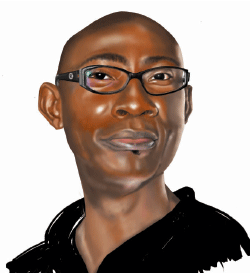The visit on Wednesday, February 25 by the Chief of Army Staff, Lt. General Kenneth Minimah, to soldiers in troubled Baga in Borno State and his comments are reassuring.
“My visit here is a confidence-building trip and is meant to inform you that all Nigerians are singing your praises for your courage and urge you to keep up the tempo. You have made Nigerians proud. From today, it will never be possible for the insurgents to take hold of any of our territories.
“Today it is going to be victory all the way because the war is almost ended. From here we move to retake Gworza, Marte and Madagali. With this, there is going to be no more Boko Haram; the slogan is ‘never again’ and even the president shares in this slogan,” he told the troops.
I was overwhelmed with joy the previous day listening to lawmakers in the House of Representatives pouring encomium on the military for the recent efforts to tame Boko Haram.
The All Progressives Congress (APC) joined in praising the incursion of the military into Borno and other parts of the North East, mainly Sambisa forest, which the jihadists have turned into abodes from where they dispense terror.
The praise of the military high command by legislators and opposition parties were actually meant for the Commander-in-Chief of the Armed Forces, President Goodluck Jonathan, the Chief Security Officer of the country.
Electioneering has become an avenue for politicians to abuse themselves and reduce serious security and development matters to inanities. But for the first time lawmakers set aside party differences and partisan politics to be patriotic.
It started with a motion moved by Muhammad Monguno, an APC legislator from Borno State, who lauded the military for its bravery and steadfastness in the past few days, particularly as Boko Haram members, who until last week were over running Borno and its environs, are now fleeing for their lives.
Abubakar Momoh (Social Democratic Party, Edo), commended the soldiers for their gallantry. “We are aware that a few months ago Boko Haram unleashed a reign of terror on many parts of the North East. But today this has been curtailed.
“We need to commend the military and the Commander-in-Chief, President Jonathan, who made it possible for the soldiers to operate effectively,” Momoh said.
Leo Ogor, Deputy House Leader (Peoples Democratic Party, Delta), noted that what happened in Borno is a sign that the military is working, and “it is therefore important to appreciate what they are doing. We also need to commend other nations – Chad, Cameroun and Niger – for assisting us in fighting this battle.
“We need, also, to commend the commander-in-chief for his bold steps in ensuring that there is security in the beleaguered areas within six weeks (before the elections).”
It does not matter that the APC insisted that Jonathan must take responsibility for the state of (in)security in the country, which the party said has led to the death of 15,000 Nigerians.
What is instructive is that even APC presidential candidate, Muhammadu Buhari, has acknowledged the good job the military is doing and wants it to sustain the tempo.
Garba Shehu, Buhari Campaign Director of Media and Publicity, quoted him as expressing delight with the speed and efficiency with which several towns and villages in the North East – Baga, Konduga, Dikwa, et cetera – have been liberated by troops.
Shehu wrote: “It is refreshing to realise as patriotic Nigerians that indeed we have a military that can hold its own in combat and by so doing be an inspiration, and complement the efforts of friendly forces fighting alongside them.
“While we have noted the full display of professionalism and courage in combat exhibited by the gallant officers and soldiers of the Nigerian Armed Forces, we also pay tribute to their allies from Cameroun, Chad and Niger who are fighting alongside them.
“Terrorism being the scourge of today’s world requires the collective effort and resolve of the international community and relevant regional forces to deal with.
“As we celebrate the triumph of our forces and look forward to the eventual weakening and possible annihilation of the terrorists from our territory and the sub-region, we urge the Armed Forces to do more and ensure that territories already re-captured do not fall again to the terrorists and that reasonable security is provided to encourage the displaced population to return to their homelands.”
Way back in 1933, former United States President, Franklin Roosevelt, had terror to confront; which made him say that “the only thing we have to fear is fear itself.” He described the situation then as “nameless, unreasoning, unjustified terror.”
The threats of aggression and nuclear warfare which Joseph Stalin’s Soviet Union posed to the U.S. could not have been worse than the terrorism fast rearing its ugly head and making the leaders of the most powerful country in the world to cower in fear.
Writing in the book, the Post-American World, on what the situation looked like way back in the U.S., Fareed Zakaria noted that, “America has become a nation consumed by anxiety, worried about terrorists and rogue nations, Muslims and Mexicans, foreign companies and free trade, immigrants and international organisations.
“The strongest nation in the history of the world now sees itself as besieged by forces beyond its control. While the Bush administration has contributed mightily to this state of affairs, it is a phenomenon that goes beyond one president. Too many Americans have been taken in by a rhetoric of fear.”
Zakaria could not fathom why Roosevelt was “arguing against fear when America’s economic and political system was near collapse, when a quarter of the workforce was unemployed, and when fascism was on the march around the world.”
Years after Roosevelt left office, Presidents George Bush, Bill Clinton and, recently, Barack Obama, had terror to deal with – bigger in magnitude than the measure the Roosevelt administration experienced.
Today, Americans can beat their chest and say they have done well to keep their country together despite the fear of terror thought to be their greatest albatross.
Politics or not, Americans see the oneness or indivisibility of their country as not negotiable. They work together when the interest and unity of the U.S. are involved. Republicans and Democrats do not discuss the future of America on party lines, the way political parties do in Africa.
The patriotic and nationalistic zeal of Americans, leaders and the led, are simply second to none. Little wonder the American government and its leaders are as proud and bold as the citizens, no matter where they find themselves. The death of one American is as bad as the death of several Americans, whether as a result of natural or other causes.
There is a nexus between the challenges Roosevelt and other U.S. presidents faced over terror that made them cry out, and what Jonathan faces today.
A substantial part of the Jonathan administration has been messed up by Boko Haram, blurring its achievements. As Zakaria noted about Roosevelt, Jonathan has been taken in by the fear of Boko Haram that so many other things were left to suffer.
Now that he seems to have got his act together by investing in the military, and we are beginning to get results, is it not time we put politics aside and confront the monster called terror as one indivisible family?
With the military working to restore normalcy in the North East, the indigenes can reclaim their homesteads and cast their ballots on March 28 and April 11.












